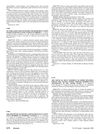 258 citations,
July 2016 in “Reproductive Biology and Endocrinology”
258 citations,
July 2016 in “Reproductive Biology and Endocrinology” The document concludes that insulin resistance is key in PCOS development and early treatment is crucial to prevent complications.
 33 citations,
October 1994 in “The Journal of Clinical Endocrinology and Metabolism”
33 citations,
October 1994 in “The Journal of Clinical Endocrinology and Metabolism” Finasteride reduces hair growth and is safe for women with excessive hair.
78 citations,
October 2003 in “Cochrane library” Cyproterone acetate with estradiol may subjectively improve excessive hair growth in women, but it's not clinically better than other treatments.
December 2022 in “Indian Journal of Endocrinology and Metabolism” Six months of treatment improved PCOS symptoms and reduced AMH levels.
 5 citations,
June 2015 in “International Journal of Women's Dermatology”
5 citations,
June 2015 in “International Journal of Women's Dermatology” Hirsutism, excessive hair growth in women, is often caused by PCOS and can be managed with medication and personalized treatment plans.
19 citations,
March 1994 in “Fertility and sterility” The combination therapy reduced hirsutism in women with PCOD and was well-tolerated.
7 citations,
April 1992 in “Journal of steroid biochemistry and molecular biology/The Journal of steroid biochemistry and molecular biology” Women with non-classical congenital adrenal hyperplasia have higher levels of certain steroids, which can be reduced by treatment.
94 citations,
July 1991 in “Clinical endocrinology” Cyproterone acetate at 2mg daily is as effective as higher doses for treating excessive hair growth in women.
1 citations,
March 2013 in “Clinical, cosmetic and investigational dermatology” The boy's hair loss was due to a hair-pulling disorder, not just a fungal infection.
 49 citations,
April 1997 in “Human reproduction”
49 citations,
April 1997 in “Human reproduction” Hormone therapy for excessive hair growth is as good with GnRHa as with high-dose CPA, but GnRHa has longer-lasting results.
 January 2023 in “Open Journal of Endocrine and Metabolic Diseases”
January 2023 in “Open Journal of Endocrine and Metabolic Diseases” Hyperandrogenism is a common hormonal disorder in women, often linked to PCOS.
 7 citations,
January 2015 in “Case reports in endocrinology”
7 citations,
January 2015 in “Case reports in endocrinology” The document concludes that HAIR-AN syndrome should be considered when a patient shows severe hyperandrogenism and insulin resistance after excluding tumors.
 29 citations,
February 2017 in “International Journal of Women's Dermatology”
29 citations,
February 2017 in “International Journal of Women's Dermatology” Women with excessive male-pattern hair growth should get a full hormone check-up to find and treat any underlying issues, considering both medical and emotional aspects.

The study concluded that hirsutism is most common in women aged 14 to 48, often caused by PCOS, and can be effectively treated with Nd YAG laser and IPL.
 March 2018 in “Benha Journal of Applied Sciences”
March 2018 in “Benha Journal of Applied Sciences” Finger length ratio is not linked to hirsutism or hormone levels.
 23 citations,
April 1999 in “The Journal of Clinical Endocrinology and Metabolism”
23 citations,
April 1999 in “The Journal of Clinical Endocrinology and Metabolism” All treatments reduce hair growth; low dose flutamide most effective with fewer side effects.
 113 citations,
April 1999 in “The Journal of Clinical Endocrinology and Metabolism”
113 citations,
April 1999 in “The Journal of Clinical Endocrinology and Metabolism” Cyproterone acetate-estrogen most effective for hirsutism, but consider side effects and patient needs.
 32 citations,
July 1999 in “Fertility and Sterility”
32 citations,
July 1999 in “Fertility and Sterility” Finasteride and flutamide both reduce hair growth, but finasteride has fewer side effects.
 50 citations,
May 2000 in “Fertility and Sterility”
50 citations,
May 2000 in “Fertility and Sterility” Flutamide reduces hair growth better but has more side effects.
 63 citations,
March 2001 in “Fertility and Sterility”
63 citations,
March 2001 in “Fertility and Sterility” Diane 35 plus finasteride is more effective for treating hirsutism.
 12 citations,
December 2002 in “Fertility and Sterility”
12 citations,
December 2002 in “Fertility and Sterility” Spironolactone plus finasteride works better for treating hirsutism.
 40 citations,
January 2003 in “Gynecological Endocrinology”
40 citations,
January 2003 in “Gynecological Endocrinology” Finasteride effectively reduces hair growth in women with polycystic ovary syndrome or idiopathic hirsutism.
 39 citations,
August 2004 in “International journal of gynaecology and obstetrics”
39 citations,
August 2004 in “International journal of gynaecology and obstetrics” Finasteride and CPA-EE2 equally reduce hirsutism, but affect hormone levels differently.
 39 citations,
May 2011 in “European Journal of Clinical Investigation”
39 citations,
May 2011 in “European Journal of Clinical Investigation” Hirsutism can be caused by various conditions besides PCOS, and it's important to treat the underlying issue and manage symptoms with medication and cosmetic approaches.
 September 2008 in “Fertility and Sterility”
September 2008 in “Fertility and Sterility” Men and women in infertile couples feel using donor sperm may cause more stress and marital issues than using donor eggs.
 78 citations,
May 1989 in “The Journal of Clinical Endocrinology & Metabolism”
78 citations,
May 1989 in “The Journal of Clinical Endocrinology & Metabolism” Spironolactone effectively reduces hair growth in women with hirsutism and is generally well-tolerated.
 54 citations,
November 2017 in “Scientific Reports”
54 citations,
November 2017 in “Scientific Reports” The study found that certain microRNAs are higher in the cells and lower in the fluid of women with a specific type of polycystic ovary syndrome, and one microRNA could potentially help diagnose the condition.
 19 citations,
March 2008 in “Nature clinical practice endocrinology & metabolism”
19 citations,
March 2008 in “Nature clinical practice endocrinology & metabolism” A combined drug and laser treatment improved hirsutism in a PCOS patient, also enhancing her heart health and requiring regular liver and kidney checks.
 4 citations,
April 2012 in “Our Dermatology Online”
4 citations,
April 2012 in “Our Dermatology Online” The conclusion is that PCOS is a common cause of hirsutism in young obese women, and early treatment is important to reduce the risk of metabolic syndrome.
 37 citations,
December 2007 in “International journal of clinical practice”
37 citations,
December 2007 in “International journal of clinical practice” Hirsutism is excessive male-pattern hair growth in women, often caused by hormonal imbalances, and requires ongoing treatment to manage.
























